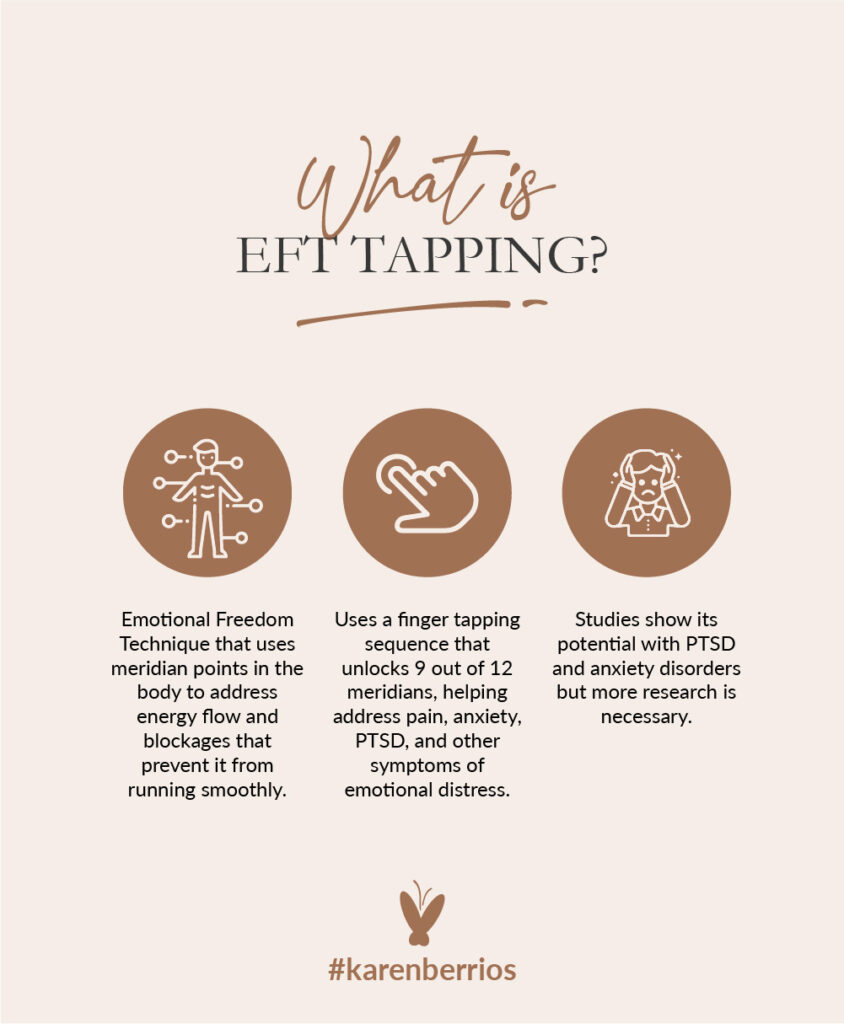

What is EFT Tapping?
EFT Tapping. You might have heard about EFT tapping as an alternative treatment for dealing with chronic pain, anxiety, and emotional distress. You might have also heard many people swearing by it and wanting to share awareness around it, promoting it through each and every platform. So, what is it exactly and how does it help you heal?
What is EFT Tapping?
Also known as the Emotional Freedom Technique, tapping is a technique that’s meant to balance out your entire system and help you deal with pain, distress, trauma, and anxiety. It was developed by Gary Craig, who describes it as the “universal healing tool that can provide impressive results for physical, emotional, and performance issues.”
The premise of this healing technique is that a disruption in energy is the main cause of all negative emotions, emotional patterns, and chronic pain as unresolved emotional issues are in the way of every part of your life that needs improvement.
And since it’s widely known that emotional distress can cause pain and other issues to show up in your body, it’s only logical to work on those emotional and traumatic blocks in order to really promote healing. And even though EFT tapping is known to work by addressing only physical symptoms, it isn’t until they’re connected to the emotional contributors, that the deep, long-lasting results actually occur.
That’s why EFT treatment can be used to heal a specific disorder, physical pain, and symptoms of anxiety disorder, but it can also be an ongoing process to clear out the old traumas and potentially face new obstacles and challenges in a more healthy way.
Even though it’s still under research, EFT tapping has been used as a treatment for post-traumatic stress disorder (PTSD) and anxiety, showcasing its real power and potential.
The EFT Tapping Technique
EFT tapping focuses on the meridian points in the body in order to balance out your energy. It’s based on Chinese medicine so it has certain similarities and touching points with acupuncture and acupressure. These meridian points are believed to be the areas of the body through which energy flows freely. When there’s a blockage, the energy can’t flow, and this is the main cause of many diseases, sickness, hormone imbalance, and mental health issues.
The difference between acupuncture, acupressure, and EFT tapping is that one uses needles, the other pressure, and EFT uses fingertip tapping to apply pressure. This fingertip tapping helps send signals into the area of the brain that controls stress and cortisol, helping activate the parasympathetic nervous system and allowing you to relax. Consequently, this helps relieve any negative emotions you might be holding on to, restoring the imbalance of energy along the way.
5 Steps of EFT Tapping
The emotional freedom technique can be divided into five important steps which can be repeated for as many issues, pains, or fears you’re trying to release. Focusing on one issue at a time has been proven to be the most beneficial, so it’s best to do all five steps for each issue individually.
Step 1 – Identifying the issue
Before you start tapping, it’s important to create your focal point, or the issue you’re trying to work on. It can be a fear you have, a trigger for your anxiety, a fear, or anything that causes stress, negative emotions, or pain.
Step 2 – Set the benchmark of intensity
On a scale of 0-10, with 10 being the worst or hardest, identify your issue with the amount of physical pain or emotional discomfort you feel around it. This will help you track progress after you’ve finished the full five steps.
Step 3 – Establish a setup phrase
Create a phrase that helps you acknowledge your issue and accept yourself despite it. The most common setup phrase used is “Even though I have this [fear or problem], I deeply and completely accept myself.” The trick is to always focus on yourself and how the issue you’re trying to relieve is connected to you. You might have a problem or fear that’s pertaining to someone else, but the goal is to connect it to your feelings about it and use EFT tapping to tap into that.
Step 4 – The tapping sequence
The fingertip methodic tapping sequence puts pressure on nine of the twelve main meridian points in the body. These meridians are:
- Chin (Ch): central vessel
- Karate chop (KC): small intestine meridian
- Top of the head (TH): governing vessel
- Eyebrow (EB): bladder meridian
- Under the nose (UN): governing vessel
- Side of the eye (SE): gallbladder meridian
- Under the eye (UE): stomach meridian
- Beginning of the collarbone (CB): kidney meridian
- Under the arm (UA): spleen meridian
The EFT tapping sequence starts with the karate chop point while you’re simultaneously reciting your setup phrase three times. Then, you tap each of the following points seven times, moving down the body in this ascending order:
- eyebrow
- side of the eye
- under the eye
- under the nose
- chin
- beginning of the collarbone
- under the arm
- top of the head
Usually, the sequence is repeated two or three times, but you can do more if you’re feeling like you need it to successfully shift energy.
Step 5 – The Assessment
After you’ve completed your EFT tapping sequence, it’s time to go back to that rating scale and assess the intensity of your issue. Compare it to your initial intensity level and if it doesn’t go to 0, repeat the tapping sequence until it does.

EFT Tapping and PTSD
A study from 2013 analyzed the effect of the EFT tapping technique on war veterans diagnosed with PTSD compared to those receiving standard care. The results showed incredible improvements after only one month, reducing their post-traumatic stress disorder symptoms to the point that more than half of the EFT test group no longer fit the criteria for PTSD.
Another study, this time done in 2016, reviewed the effectiveness of using clinical EFT tapping over standard care options for anxiety disorders. It concluded with a significant reduction in psychological stress, but more research is needed to analyze its effectiveness when compared to other cognitive therapy techniques.
Final Thoughts
EFT tapping is based on Chinese medicine and it puts energy flow as the focus of attention. When there’s an imbalance of energy, inflammation can occur, creating a space for disease, stress, and other physical and mental issues. Even though the research is still pretty scarce, the results that are there do prove its powerful potential that’s worth literally tapping into.

hey there
I'm Karen!
I have found my cancer journey to be a positive and profound transformational experience. I’m inspired to share my healing journey here, and trust you’ll find hope, encouragement and purpose as you discover the healing power that lies within you.
Join
The Mailing List!
By signing up for my newsletter, you agree with our Privacy Policy and Terms & Conditions.


